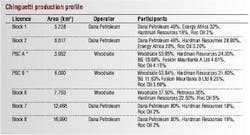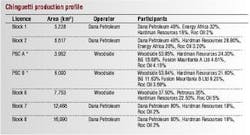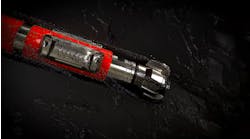Environmental issues challenge development
Catriona Boggan
Wood Mackenzie
Following the announcement by Woodside in January that the Chinguetti field is commercial, Mauritania should be on track to produce its first oil by 2006. Furthermore, Woodside's latest offshore discovery, Tiof, is looking very promising and could potentially be larger than Chin-guetti. Should this be the case, Tiof would be a future development contender and Mauri-tania could have two deepwater projects onstream by the end of the decade.
The main players in Mauritania are the mid-size independents and smaller companies, and Mauritania is an ideal country for these companies to undertake exploration and development activities, for several reasons. First, Mauritania does not require large signature bonuses to acquire exploration acreage, unlike some West African countries, such as Angola, São Tomé, and Nigeria. Second, the fiscal terms are considered attractive, enabling relatively small developments to be monetized rapidly. The Mauri-tanian government takes less of the profit oil to attract investment in its oil and gas business. Finally, the potential for adding value through exploration is relatively high, with significant levels of exploration drilling expected in the coming years.
From 1960 to 1992, previous operators of Mauritania's offshore acreage – Amoco, Esso, Hispanoil, Mobil, and Shell – drilled around 11 offshore exploration wells and acquired more than 36,000 km of seismic data. Most of the wells were unsuccessful and targeted extensive Late Cretaceous deltaic sediments in the northern part of the basin and in relatively shallow water. Exploration was then halted in 1993 as hostilities between Mauri-tania and Western Sahara forced the oil companies to withdraw from the country.
Exploration resumed in 1996 when Hardman Resources signed three exploration licenses for blocks 3, 4, and 5 covering an area of more than 24,645 sq km, which represented approximately 50% of the country's offshore acreage. In August 1998, British Borneo (subsequently acquired by Eni) and Australia's Woodside Petroleum signed a farm-in agreement with Hardman Resources covering all its acreage. The deal gave British Borneo and Woodside 35% in the newly formed PSC A and PSC B areas, with Woodside taking over the operatorship.
In December 2003, Eni, the only major oil company active in Mauritania, decided to sell its 35% interest in both Area A and Area B to the other four participants on a pro-rata basis. Hardman Resources was then quick to farm-out its share of the Eni deal to BG, which acquired 13.084% in PSC A and 11.63% in PSC B in an agreement announced in February. This deal is significant as it demonstrates that a mid-sized oil company such as BG considers Mauritania to be an attractive new area to conduct exploration and production activities with the view to expanding its upstream position in the Atlantic basin.
First deepwater discovery
Since taking over the role of operator from Hardman, Woodside has acquired more than 3,580 sq km of 3D seismic and drilled a total of seven exploration wells and three appraisal wells in its offshore acreage. Out of the seven exploration wells, four have been successful, giving Woodside a 57% success rate. In fact, Woodside's first exploration well, Chinguetti-1 drilled in May 2001, discovered Mauritania's first oil field, Chinguetti. The well was located 90 km off the Mauritanian coast in 800 m of water.
Part of Woodside's 2002 drilling campaign consisted of two successful appraisal wells on the Chinguetti structure. More recently, Woodside drilled a successful combined appraisal and early development well on Chinguetti during November 2003. The well was suspended as a potential future oil producer.
The completion of this well has helped the partners to firm up the possible development options for the project. Woodside is expected to submit its preferred development solution for approval in the first half of 2004. Chin-guetti development facilities are expected to include an FPSO with a processing capacity of between 50,000 and 90,000 b/d and a storage capacity of around 1.1 M bbl. Contractors submitted their technical bids to supply the FPSO last October, and Woodside is expec-ted to make an award decision shortly.
Woodside is expecting to achieve first oil production from Chinguetti by the beginning of 2006. It is likely that Chinguetti production will peak in excess of 72,000 b/d in 2007. This production profile would recover 130 MMbbl of oil from the field.
Chinguetti's development will not be without its challenges, as Mauritania is located further north and is more mid-ocean than some of the more established producing West African countries. This means that Mauritania does not enjoy benign weather and sea conditions, and the Chinguetti facilities will have to be installed and operated in a challenging environment. In addition, the Chinguetti field reservoir and the Mauritania Coastal basin are poorly understood at present. Furthermore, there is limited industrial infrastructure in Mauritania, and all the hardware required for Chinguetti's development would have to be assembled elsewhere and shipped in.
Other discoveries
Following the discovery of Chinguetti, Woodside went on to make two potentially commercial finds on its deepwater acreage during 2002 and 2003. The first was the Banda field on PSC A, which is situated in a water depth of 306 m and around 20 km east of Chinguetti. Banda appears to contain a significant amount of gas (around 1.5 tcf) with a relatively thin oil column. If there are sufficient oil reserves, the field could be tied in to the Chinguetti infrastructure. Studies would have to determine on how the gas could be monetized, however, as there is no gas market in Mauritania.
The second oil discovery, Tiof, which is located 25 km from Chinguetti, was made in November 2003. Early indications from the operator are encouraging, and information published by Hardman Resources, one of the partners in the field, indicates that Tiof could contain up to 200 MMbbl of recoverable oil. Further, Woodside announced in December that the Tiof West well, situated only 8 km from Tiof, discovered significant amounts of oil and gas.
If Tiof/Tiof West is as large as Hardman Resources originally speculated, it would probably be exploited on a stand-alone basis. If further investigation shows it to be smaller than first thought, however, it could still be tied back to the Chinguetti FPSO.
In addition to Woodside, the only other operator at present in Mauritania is UK independent Dana Petroleum. Dana began operating in Mauritania in June 1999, when it was awarded three new production sharing contracts for blocks 1, 7, and 8. The blocks cover a combined area of 34,000 sq km, extending into water depths of over 2,000 m.
In late December 2003, Dana announced that its first exploration well, Pelican-1, on block 7 had discovered significant amounts of hydrocarbons within its primary Tertiary horizon at a water depth of 1,700 m and approximately 150 km north of Chinguetti. The well was drilled to a total depth of 3,825 m with oil and gas shows encountered while drilling from approximately 3,400 m to total depth. It is too early to conclude whether Pelican-1 has discovered an independent gas field or a gas cap overlying an oil field.
This is an important discovery, as it proves that there are hydrocarbons present in the northern part of Mauritania's offshore basin.
It is likely that the exploration success experienced in Mauritania will lead to an increased level of exploration drilling in neighboring countries such as Senegal, Guinea Bissau, Gambia, and the AGC region between Senegal and Guinea Bissau. Exploration wells are planned in all of these countries over the next few years. It is worth noting, however, that the plays on offer are largely unproven and high risk. It remains to be seen the whether the present wave of enthusiasm would counter any initial drilling disappointments.
Author
Catriona Boggon is a consultant specializing in West Africa Energy at Wood Mackenzie.
For more information, Tel: +44 131 243 4250 or email [email protected]




